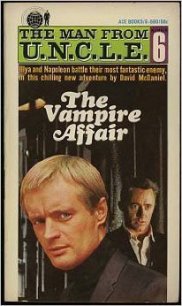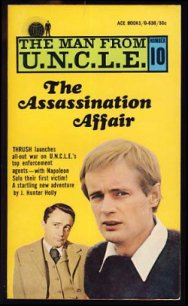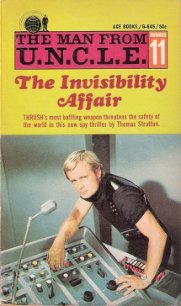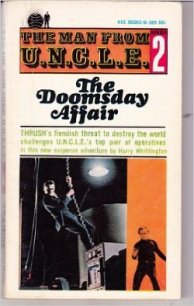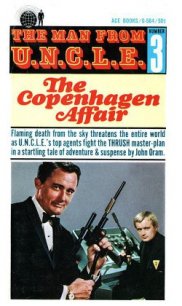The Thousand Coffin Affair - Avallone Michael (бесплатная регистрация книга .txt) 📗
Yes, it would be easy, Solo reflected. Like dropping in to tea with the Grand Duchess.
“Radio’s working fine,” Jerry Terry said flatly. The roar of the bomber engines was like far-off thunder.
“Good,” Kuryakin said. “Communications mean a lot this trip.”
“Kuryakin,” she whispered suddenly. “Make yourself scarce, will you?”
He grinned, not offended. “I’ll see if there’s any coffee left in the commissary.” He shouldered down the aisle, going forward, his pack and parachute making him seem pounds heavier.
Jerry Terry slid into the seat alongside Solo. He turned from contemplation of the dark sky beyond the wings.
“Stinker,” she hissed.
“Who, me?” he said banteringly.
“Keep it up. Smile. Big hero. You could get killed on this stunt, you know that? Two to one old Skull Face is sitting down there just waiting for you to come back. You’re so irresistible in your own unforgettable way.”
“Am I?” he said, keeping a smile from creeping across his face.
“Oh, Napoleon.” She crumpled against him, all the anger gone out of her. “Why do you have to be so irresistible? I was doing fine until you showed up, you know that? Men don’t mean that much to me.”
“And they do now?” he asked softly, brushing her forehead with his lips.
“Yes, no. Oh, you know what I mean.”
“Jerry, listen to me.”
“Tell me to be brave and I’ll spit right in your eye.”
“No,” he agreed. “I wasn’t going to say that.”
She pushed away from him, searching his eyes. “No, you wouldn’t. What were you going to say, Napoleon?” He stared at her soberly.
“I owe this one to Stewart Fromes and a lot of other people. You understand?”
“Yes—I think I do.”
“Plus which I have no intention of dying. Believe it. I like life, cigarettes and coffee. And girls.”
She recognized what he was trying to say despite the mockery of his curved smile.
“You’re still a stinker, Solo.”
“Of course I am.”
The intercom came alive again. “Five minutes.”
They kissed. A quick warm kiss. Jerry Terry sighed and brushed a bright strand of hair from her face.
And then Kuryakin had come back, almost apologetically, checking his equipment and gear one final time. “I am sorry,” he said, “but it is just about that time.
“One minute to zero,” the intercom said.
They stood in line beside the bail-out door, their drop lines secured to the long bar parallel to the cabin. The voice on the intercom began a countdown. Solo did not look back at the girl. He stared into the darkness yawning beyond the fringe of the air door.
Kuryakin was right behind him, the dour face happy. He was idly humming something that sounded vaguely Russian. A gloomy, low refrain.
The slipstream made Solo’s flying suit billow. He concentrated on the voice of the intercom:
“…nine, eight, seven, six…”
Six seconds to eternity. And the solution of Stewart Fromes’ problem.
And then five. Had he really been right or was it all a game?
And then four. Three. Three to success or death.
“…two…one!”
He stepped through the air door and was caught by the wind, his line releasing him. Darkness sprang up to meet him. The engine’s roar moved on. And he was falling, falling…
The dark world over Orangeberg waited to meet his hurtling body.
Solo came down with a lurch on a rising hillock of ground. Luckily, he had missed the trees. His body rolled, the shrouds of his chute picking up the worst of a brisk wind which billowed the silken folds back to umbrella shape. He scrambled erect, fighting the breeze, pulling the shroud lines to him, shortening the bursting strength of the wind. Soon he had collapsed the chute and unbuckled the harness, standing on the thing before it could sail away into the darkness of the night.
He searched the sky for Kuryakin, happy to see the white mushroom of his chute making contact with the ground less than three hundred yards away. Elatedly, he balled up his pack and hurried toward his fellow agent. You could never be sure about a drop. The unexpected was always likely to happen when you least expected it.
Kuryakin had mastered his own difficulties by the time he reached him. They shook hands warmly, glad to be alive, and set about burying their silken passports to Germany.
From on high came the muffled boom of the bomber as it flashed on for a fifteen minute run toward the Russian border. On its return flight, another fifteen minutes, it would attempt to make contact with them. That gave Solo and Kuryakin exactly thirty minutes to find Orangeberg, dig up one grave, and reach a decision. One half hour to discover if they were right or wrong about the cemetery sleeping quietly in the lowlands beyond Oberteisendorf.
Kuryakin tamped the earth down on the remainder of his parachute. He grunted in satisfaction and replaced the entrenching tool on the hook fastened to his pack. The wind billowed his flying suit as he turned to Solo.
“It’s your expedition, Napoleon.”
“All expenses paid. I make the cemetery out due north of us according to the compass. Maybe a thousand yards. Not too bad a drop, considering.”
“Recognize anything yet?”
“Hard to tell. Landmarks at night are always a fooler. But there’s a reasonable familiarity about the neighborhood. Shall we go?”
“Let’s,” grinned Kuryakin, his teeth flashing in the darkness. “I haven’t dug a grave in years.”
They worked toward the direction Solo’s wrist compass indicated, finding the going amazingly even. The land was low, flat and undisturbed by foliage of any kind. Had it been a moonlit night, it would have been a cakewalk. Yet the extreme darkness was a blessing in disguise. They were, after all, in enemy territory, Golgotha’s back yard, and while the possibility of land mines, booby traps and electronic alarm systems was not to be discounted there was no time to worry about incalculables.
They pushed on, finding the ground easy to traverse, watching the shadowy distance unfold before them, identifying each indistinguishable clump of earth and darkness as a potential enemy until they reached it. Solo had his automatic pistol at the ready. A nighthawk cawed once and they both waited for the tell-tale sound of men moving that might follow. None came. They moved on.
The earth narrowed and the high walls of a gorge rose about them, only to level off into more flatland. Solo spotted a familiar rise in the terrain and his hopes rose with it. Something about the topography was eminently right, now. Yes, yes—there it was. The earth stopped and suddenly a long, knee-high bunker of concrete was before them. Here and there, a gleaming tombstone winked white in the darkness, its stone angles catching random stabs of reflected light.
“Napoleon—” Kuryakin whispered.
“Yes. Orangeberg. Let’s find a dead one.”‘
“Right. No sense in pushing our luck. We’ll take the first one we come across. I want to stay as close to the wall as possible.”
“Check.”
They slipped over the wall, careful to keep their many items of equipment from making undue noises. Their boots made contact with soft dry ground. The even, terraced nature of the earth was not lost on them. A row of headstones, barely twenty-five yards away, poked eerily into view.
The utter desolation of Orangeberg was now readily apparent. An almost palpable silence hung over the cemetery. An aura of everlasting stillness. Solo had seen Orangeberg from the air and understood the vast size of the place. Yet down here, the sensation was one of telescoping in size, as if in microcosm—it was only another burying place like a million other nameless ones all over the world. It was an odd sensation. The miles had shriveled down to the twenty-five yards that was as far as his eyes could make out in the darkness. Were it not for the silvery shafts of the headstones just before them, they might have stood in any gloomy vacant lot.
